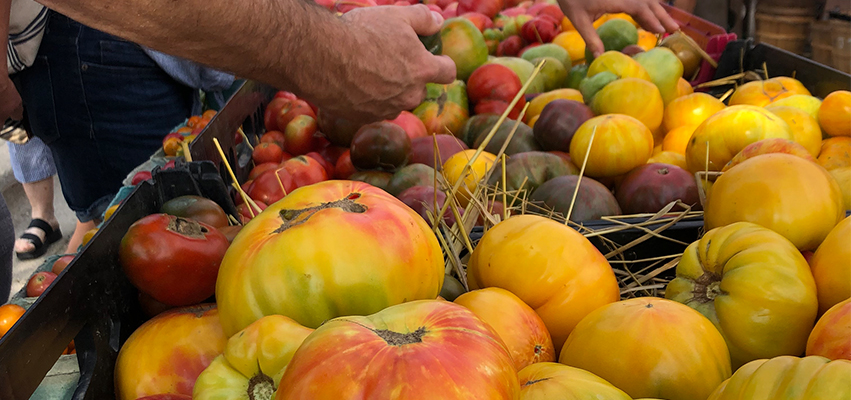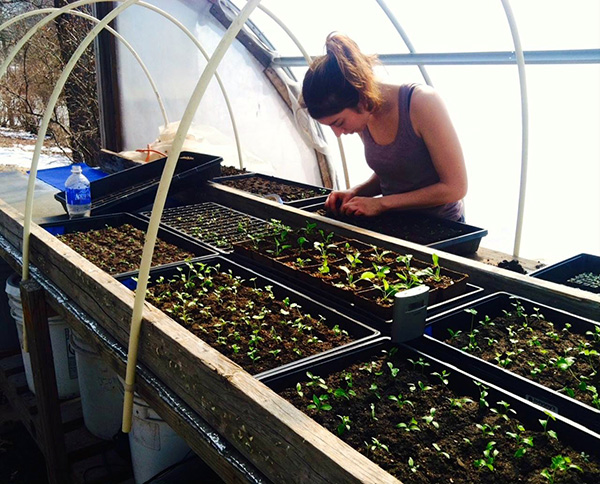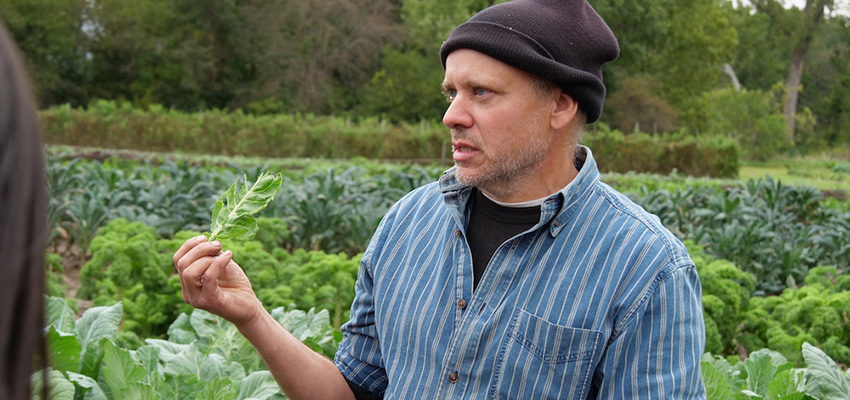
Remember the early days of the pandemic when store shelves emptied and even staples like flour were hard to find?
I do, because I was helping out at Janie’s Farm and Janie’s Mill, a family-owned organic grain farm and stonemilling company in central Illinois. While supply-chain issues plagued the nation, the folks at Janie’s Mill simply drove a few miles down the road to their grain bins and milled more grain into flour. There was no disruption in their ability to supply online customers or local bakers and retailers such as Ardor and Sous Chef in Peoria. Why? Because of their short supply chain running from farm to mill to you.
Similarly, when large meat-packing plants shut down because COVID was running rampant among their workforces, local livestock farmers such as Trails End, Broad Branch and Wettstein Organic Farm kept supplying local folks thanks to their short food chain running from farm to Bittner’s Locker in Eureka to you.
And when the produce aisle in the grocery store was sparse, our local fruit and vegetable farmers kept our community supplied with fresh, delicious produce at farmers markets and through Community Supported Agriculture (CSA) subscriptions.
THE BAD NEWS
Now the war in Ukraine is causing huge food prices increases. Global food shortages are looming. What’s clear is that the old food system was efficient and reliable only as long as there were no disruptions — no pandemics, no wars, no changed climate.
Unfortunately, the new normal is things not being normal, so we can’t rely on the old global food system anymore.

THE GOOD NEWS
Fortunately, we have a thriving local food system here in central Illinois, with many wonderful farmers working hard to put delicious and nutritious food on your table no matter what present or future shocks may disrupt the global food system.
No matter if you’re looking for stonemilled flour or cornmeal, sweet corn, peaches, pork chops or farm-fresh eggs, you can easily find someone near you on Local Harvest and other websites.
Meanwhile, in the spring and early summer, many of those farmers can offer plant starts for the ultimate food security of growing your own. Whether it’s just a pot of rosemary or thyme on your windowsill or a full vegetable takeover of your yard, growing some of your own food is fun, empowering and gives you the absolute freshest food for peak taste and nutrition.
VIRTUOUS CIRCLES OF LOCAL FOOD
Local food is more important now than ever before, as a means of improving food security while offering many social, economic, nutritional and environmental benefits to you and your community. Here are just a few of the far-reaching benefits of local food.
It tastes better and has more nutritional value: Fruits and vegetables begin losing nutrients as soon as they are picked, and most conventional produce is picked weeks before you buy it. Because local farmers often harvest their produce just 24 hours before it reaches your table, you get maximum nutrition and great taste.
It’s better for the environment: On average, food in the grocery store travels 1,500 miles from field to plate. When you buy from a local farmer, you eliminate most of those miles and the fuel and carbon footprint that goes with them. In addition, local farmers build the soil and enhance the quality of the water, air and wildlife habitat.
It’s better for the local economy: Farmers get less than 10 cents for every dollar you spend on food in the grocery store. But when you buy local food, upwards of 70 cents of each dollar goes to the farmer. And that money circulates in our community instead of going into corporate coffers. It pays the farm hands, the local hardware store owner, the workers at restaurants, banks and more. In addition, growing, processing and distributing food locally creates and sustains community-based jobs.
It enhances food security and food safety: Now that we’ve experienced what happens when national and global supply chains are disrupted by pandemics and war, we know the many points of vulnerability in the conventional food chain. Luckily, we have many local farmers who have created short, direct food chains with only one or two links between you and the farmer.
In addition to food security, you have enhanced food safety, since when you buy local food, that food is easily traceable back to the source. Plus, you can easily find a farmer who does not use pesticides or other chemicals. And most farmers markets and CSA pickup locations are outdoors, where there is much less chance of viral transmission, whether COVID or old-fashioned cold or flu viruses.
It creates community and connection: Most local farmers encourage you to visit their farms and see what they do to bring food to your table. Many also host tours so you can see the fields, discuss growing practices, and ask questions. Local farmers don’t just grow food; they grow true relationships with you and your family.

PUT YOUR MONEY WHERE YOUR MOUTH IS!
When you buy local food, you literally put your money where your mouth is. By doing so, you ensure that when the next crisis comes — and it will! — you will not only be able to continue eating great food, you’ll be enhancing relationships, strengthening your community, and creating security and stability in an otherwise unstable world.
No one can predict what the next shock to the conventional food system will be — whether war, weather, a virus, or something completely different. But when you know your local farmers, you know where your next meal is coming from.
How to Find and Support Local Farmers — and Get Great Food!
- Local Harvest:
www.localharvest.org or www.localharvest.org/peoria-il/csa
- Illinois Farmers Market:
www.ilfma.org/find-a-market
- Buy Fresh Buy Local Illinois:
www.ilstewards.org/buy-fresh-buy-local-illinois

Terra Brockman is a speaker, author and founder of The Land Connection,
an educational nonprofit. She grew up in an agricultural family, which has
farmed land in the Mackinaw River Valley, near Congerville, for generations.

